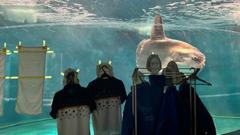The Kaikyokan aquarium's innovative method of displaying cardboard cutouts of human faces has solved health issues caused by loneliness for their resident sunfish, highlighting animal welfare practices.
**Cardboard Companions for a Lonely Sunfish in Japan**

**Cardboard Companions for a Lonely Sunfish in Japan**
A creative solution brings comfort to an isolated sunfish during aquarium renovations.
In an unprecedented move to address the well-being of a lonely sunfish, the Kaikyokan aquarium in Shimonoseki, Japan, has resorted to using life-sized cardboard cutouts of humans as companions for the fish. This unique approach was implemented after the aquarium closed for renovations in December, a period during which the sunfish exhibited troubling changes in behavior and health.
The sunfish, which was previously active and sociable, stopped eating and began displaying signs of stress, including rubbing against the aquarium walls. Initially, staff members suspected possible health issues related to parasites or digestion. However, one insightful team member proposed that the fish's distress was rooted in loneliness due to the absence of its human audience.
To alleviate the sunfish's discomfort, staff attached cutouts of human faces to uniforms along the tank. The aquarium revealed through a post on X that, fortunately, this strategy has proven successful. "It seems to be in good health again!" they shared shortly after the intervention. Following the installation of the cardboard companions, the sunfish was observed feeling better within just one day, even 'waving its fins' joyfully in the tank.
Montenegro's sunfish, measuring around 80 cm in length and weighing nearly 30 kg, has been a prominent attraction at the Kaikyokan aquarium since its arrival a year ago. Known for its distinct personality, the sunfish would approach visitors, showcasing its curiosity. The staff noted that the cutouts appeared to revive the sunfish's spirits, leading to positive interactions once more.
The aquarium's creative strategy has resonated widely on social media, where many people praised the idea and shared memories of their encounters with the sunfish before the closure. Some users are even planning visits once the aquarium reopens, demonstrating the strong bond between the sunfish and its human admirers.
This innovative solution isn’t an isolated incident; during the pandemic, Japanese zoos and aquariums have showcased their commitment to animal welfare by organizing unique ways to keep their inhabitants engaged. For example, a Tokyo aquarium arranged video calls for their eels to help them cope with the absence of human visitors. Such measures emphasize the growing recognition of the emotional and psychological health of animals in captivity across the world.
The sunfish, which was previously active and sociable, stopped eating and began displaying signs of stress, including rubbing against the aquarium walls. Initially, staff members suspected possible health issues related to parasites or digestion. However, one insightful team member proposed that the fish's distress was rooted in loneliness due to the absence of its human audience.
To alleviate the sunfish's discomfort, staff attached cutouts of human faces to uniforms along the tank. The aquarium revealed through a post on X that, fortunately, this strategy has proven successful. "It seems to be in good health again!" they shared shortly after the intervention. Following the installation of the cardboard companions, the sunfish was observed feeling better within just one day, even 'waving its fins' joyfully in the tank.
Montenegro's sunfish, measuring around 80 cm in length and weighing nearly 30 kg, has been a prominent attraction at the Kaikyokan aquarium since its arrival a year ago. Known for its distinct personality, the sunfish would approach visitors, showcasing its curiosity. The staff noted that the cutouts appeared to revive the sunfish's spirits, leading to positive interactions once more.
The aquarium's creative strategy has resonated widely on social media, where many people praised the idea and shared memories of their encounters with the sunfish before the closure. Some users are even planning visits once the aquarium reopens, demonstrating the strong bond between the sunfish and its human admirers.
This innovative solution isn’t an isolated incident; during the pandemic, Japanese zoos and aquariums have showcased their commitment to animal welfare by organizing unique ways to keep their inhabitants engaged. For example, a Tokyo aquarium arranged video calls for their eels to help them cope with the absence of human visitors. Such measures emphasize the growing recognition of the emotional and psychological health of animals in captivity across the world.



















